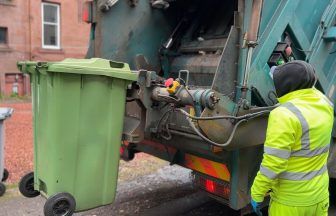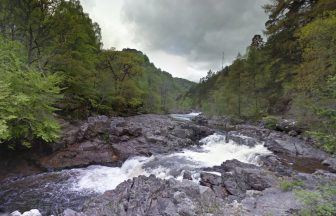Greenpeace claims an energy firm backtracked on plans to start work at a controversial oil field near Shetland after being confronted by activists.
The environmental group says Aberdeen-based Siccar Point had been due to start installing key drilling equipment at the site despite not having the required legal permission.
Activists held a protest at the company’s contracted vessel, the Siem Day, outside Stavanger, Norway on Monday.
They say the vessel was loading drilling infrastructure for the Cambo oil field.
Just hours after the protest, Siccar announced the work had been delayed until 2022 due to operational issues and weather concerns.
Mel Evans, head of oil and gas transition at Greenpeace UK, said: “This oil company brazenly preparing to set up shop at Cambo begs the question – did the (UK) government give a secret thumbs up, or were they just asleep at the wheel?
“Boris Johnson’s failure to show leadership on phasing out fossil fuels means that these oil companies feel able to complacently crack on with Cambo before securing legal permission.
“Clearly Siccar Point don’t believe the government is agonising over the environmental implications of this decision.”
Greenpeace say a notice to mariners was published on Friday, August 6, announcing the intention to start installing key drilling infrastructure, known as CAN-ductors, at the Cambo field.
That sparked concerns that work was getting under way at the development before ministers had formally given the project the go-ahead.
Jonathan Roger, CEO of Siccar Point Energy, said: “A separate consent for the installation of the conductor anchor nodes was applied for by our contractor through the appropriate regulatory channels.
“This work needs to be carried out before well construction and so can legally sit out with the full field development environmental consent process.
“Work would only ever begin with the appropriate regulatory approvals in place and a decision has been made to delay this until 2022 due to operational issues and given the closing weather window west of Shetland for this kind of operation.”
An exploration licence for the field was granted in 2001 and the Oil and Gas Authority is considering whether to approve extraction of an estimated 800 million barrels of oil there.
The UK Government is expected to announce soon whether extraction of oil and gas at the site is given approval, but First Minister Nicola Sturgeon has repeatedly refused to say whether she supports or opposes the plans.
She said earlier this month the UK Government should “reassess” the licence for the proposed oil field.
The Scottish Greens have retained their opposition to Cambo after entering into a power sharing arrangment with the SNP, but signed on to the Scottish Government’s calls for a review of licences in the 51-page document.
A spokesman for the Oil and Gas Authority said: “We do not comment on individual applications.
“An application to install a suction based well foundation will require the consent of the OGA and OPRED prior to installation, and any such OGA consent will normally include a condition to remove the device if the proposed well is not drilled by a specified date.
“Any such consent is not a consent to drill, nor is it a consent for the development of or production from a field; these are separate decisions.”
The controversial proposals have come under focus in recent weeks, coinciding with a UN panel sounding the alarm over climate change.
The UK Government could approve proposals for fossil fuel extraction from the Cambo oil field ahead of the COP26 climate summit in Glasgow in October/November.
During a visit to Scotland earlier this month, Johnson insisted that “we can’t just tear up contracts” as campaigners urged him to block the drilling of oil and gas from the seabed near Shetland.
Original licensing for fossil fuel exploration at the site – located in the North Atlantic to the west of the Shetland Islands – was initially approved in 2001.
If given the go-ahead for full extraction by the UK Government, a further 150-170 million barrels are due to be drilled from the site, which is expected to operate until 2050.
Consumption of all the oil that could be extracted from Cambo would produce 132 million tonnes of carbon, which would require a land mass 1.5 times the size of Scotland to counter.
A spokewoman for the UK Government’s department of Business, Energy and Industrial Strategy, said: “Final consent for preparatory work at the Cambo field must first be granted by the Oil & Gas Authority. Without this consent, the work cannot commence. Ministers are not involved in this process.
“Cambo is not a new oilfield – it was licensed in 2001. Oil production from this field is already factored into our projections of future supply.
“Without a domestic source of oil and gas while we transition to a low carbon future, the UK would be even more reliant on imports from other countries.”
Follow STV News on WhatsApp
Scan the QR code on your mobile device for all the latest news from around the country
























